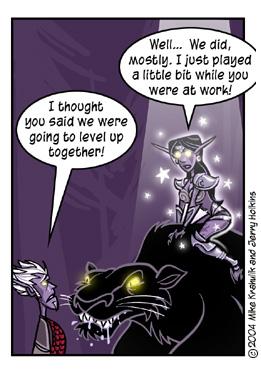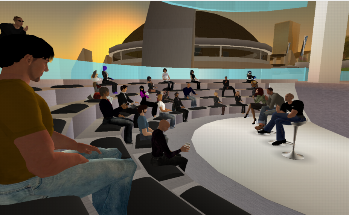Trending
Opinion: How will Project 2025 impact game developers?
The Heritage Foundation's manifesto for the possible next administration could do great harm to many, including large portions of the game development community.

Featured Blog | This community-written post highlights the best of what the game industry has to offer. Read more like it on the Game Developer Blogs or learn how to Submit Your Own Blog Post
Once upon a time there was a gamer named Shay, who had a wife named Laura...

Once upon a time there was a gamer named Shay, who had a wife named Laura. Though Shay liked the idea of playing games with his lovely wife, the only games Laura was interested in were 1) Dr. Mario, 2) Boggle online, 3) Scrabble online, and 4) more Dr. Mario. (In fact she could totally kick his butt at Dr. Mario 90% of the time; but that's not something Shay likes to dwell on.)
Then Shay began playing World of Warcraft, and a fuzzy little gnome named "Iquix" came into being. Iquix enjoyed pink hair, and questing - mostly on his own - and reached level 35 or so.
One night Shay introduced Laura to WoW, and a lovely night Elf named "Lara" came into being. At first she had a hard time learning the controls and didn't see what was fun about the game; but then she began accepting quests, going on little adventures, and completing those quests.
She found this highly enjoyable. And for a few days, the Level-35 Iquix gently helped the Level-1 Lara complete quest after quest, chuckling at her struggles with Level-3 boars that he could disintegrate with the press of a button.
It was relatively boring for Shay; but soon Lara had reached a level close to Iquix, and for a glorious couple of weeks (while Shay was on vacation), he was able to achieve one of his lifelong dreams, as he and Lara went on adventures together all across a fantasy world, completing quests, having hilarious encounters, and levelling up together.
But then vacation time ended for Shay; and before long, Iquix began to feel a bit... uncomfortable. Lara was now only two levels below him. The next day, she was 1 level above him. A week later, she was five levels higher - and Shay thought he heard Laura chuckling, as Lara disintegrated a particularly nasty space-boar that was about to kill Iquix.
And then the dream was over. Some days, Shay and Laura would both be online in the same room, and Iquix and Lara would both be on adventures... but not together. They were each on their own separate adventures, nowhere near each other; sadly, from that day on, Iquix and Lara lived in different worlds. (Literally - Outland is an entirely different planet, isn't it?)

Penny Arcade hits the nail on the head.
In my last post I described how the biggest reason for WoW's continued success (and the failure of other MMOs to topple it) was: "stickiness"... and how stickiness could take the form of someone joining a game, and making friends with other people in the game.
But there's another very important form of stickiness: bringing your "real-world" friends into the game to play it with you! This is one of the most important ways that a strong in-game community can form. (It also happens to be the best and cheapest form of marketing your game could possibly get.)
Playing a game with someone you actually see often and can talk to face-to-face is an entirely different, and generally much stronger, social experience than making friends with random strangers online who you never knew before playing the game and who you may never meet. (Research has proven that playing with strangers is, psychologically, very different from playing with friends, or withat people we can see face-to-face.)
And here at last we find the Achilles heel I talked about. The single biggest flaw of WoW is: its level system. Again, WoW owes its long-term success to people playing together: and yet the level system has the inevitable result of separating players. How can I in good conscience recommend that a friend come join me and my friends playing WoW, when I know that friend is going to have to toil in obscurity for weeks or months before they can actually play as part of our max-level guild? When it comes to stickiness, a level system is the worst feature that a game could possibly have - WoW is only sticky in spite of it... it would be hard to create a system that worked against stickiness more if you tried!
Of course this isn't only a flaw of WoW. Stickiness is a major factor in the success of every MMO; and yet every MMO I can think of (except Second Life) is built around a level system. WoW has levels because Everquest, and Ultima Online, and almost every text MUD, and almost every single-player RPG (both videogames and tabletops) all had levels.
The level system isn't easily removed from the game design, either; it affects almost every single system in the game, and everything you do in the game. And it's hard to imagine a level-less MMO; mostly just because they are so entrenched in the designs of these games, and it's hard to picture how one would play without that system.

Second Life is sticky, and has no levels. Too bad it's not fun...
Of course, I'm not the first one to point out that "levels suck": Raph Koster has used that exact phrase; and Brian "Psychochild" Green had an insightful three part series on this topic... all excellent reads.
Now, if you're reading these posts in order to try to figure out how you can shamelessly rip off one or more existing games to try to recreate their financial success without ever having to really innovate, or even think about game design or why your game is successful... then you're not finding the answer you want (and I'm glad I can't provide it to you in particular).
Even "MMO experts" like Koster and Psychochild don't have definitive answers to the question, "how a would an MMO without a level system, where everyone can play together, actually work? And still be fun??" How to replace levels is a game design challenge without a clear answer, which means it's possible that there is no answer... many will have to try, which means many will likely fail.
But, whether you're motivated by game design innovation and enabling people to play together (like me), or by crass commercial profit... it's worth trying. Both mindsets want their game to be successful. And if WoW is as successful as it is due to stickiness, even though it's built around a level system that actively works against that stickiness... can you imagine a more straightforward formula for "a WoW-killing MMO" than "an extremely fun MMO that doesn't have a level system"?
Of course as I said before, WoW is so entrenched that even if you do make a game more sticky, and even if it's slightly more fun than WoW... it would probably still fail to supercede WoW, simply because "slightly more fun" isn't enough to overcome the inertia that WoW's stickiness creates, and convince people to leave the place they're comfortable. To do that, your game would have to do one or more of the following:
Be phenomenally more fun than WoW (Considering how WoW incredibly fun WoW is, this is quite a hurdle)... AND/OR:
Be incredibly easy to start playing, and to continue playing.
It's clear to me that the formula for success must be to follow option #2: in short, to make a game that is comparably fun to WoW; that is at least as sticky as WoW; and that is much easier to get into than WoW.
But where could we possibly ever find a game platform that's already extremely sticky (say, one that already has about 30x the number of users WoW does, all of whom are socially connected to their friends)? Much less one where it's also easy to start playing multiplayer persistent games; easy to keep playing those games; and (almost too) easy to share those games with your friends and suggest that they join you in playing them?
I'm still trying to puzzle out the answer to that one. If you have any ideas, shoot me a message on Facebook - I usually see those faster than I see emails anyway.
Read more about:
Featured BlogsYou May Also Like